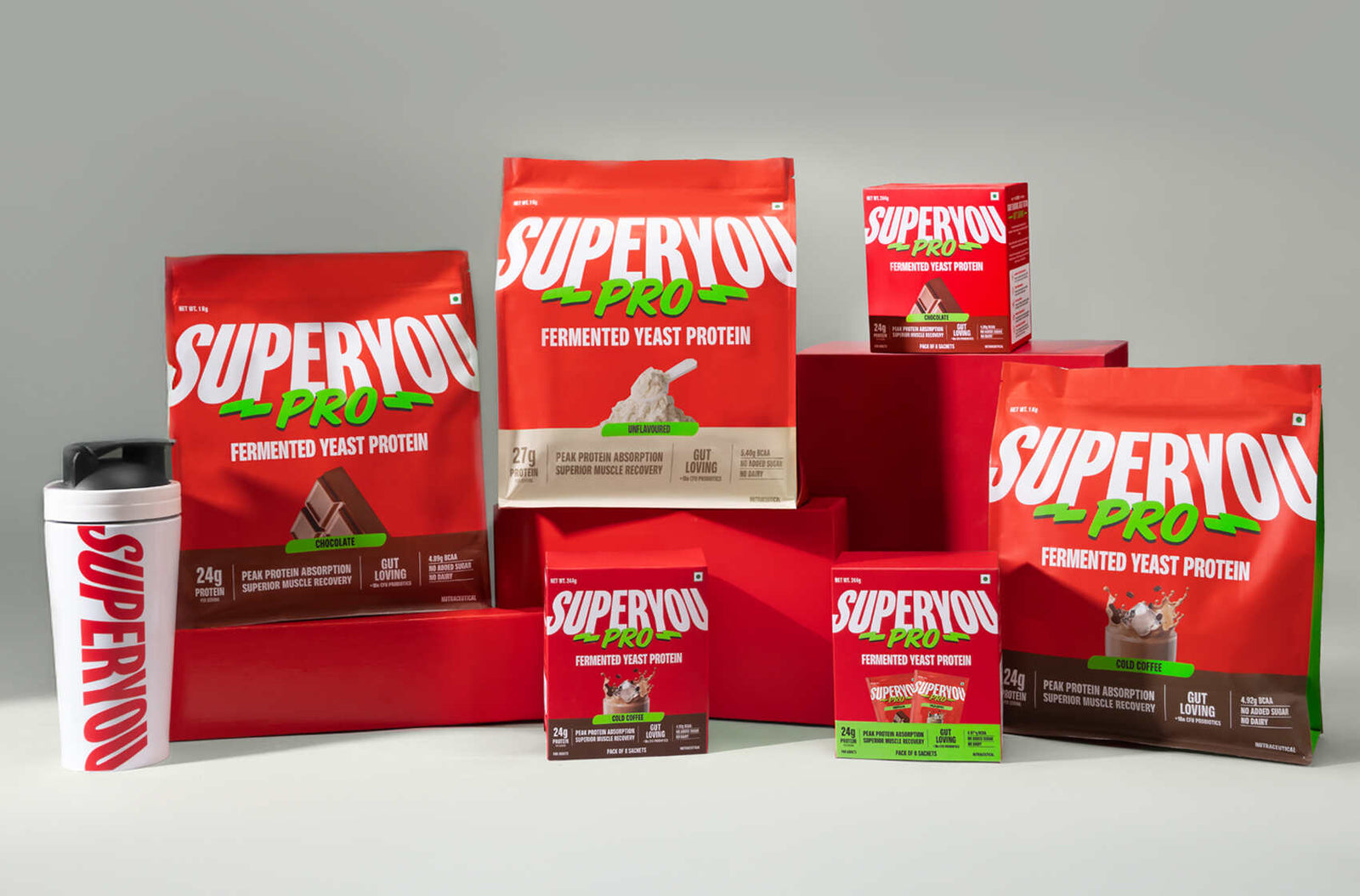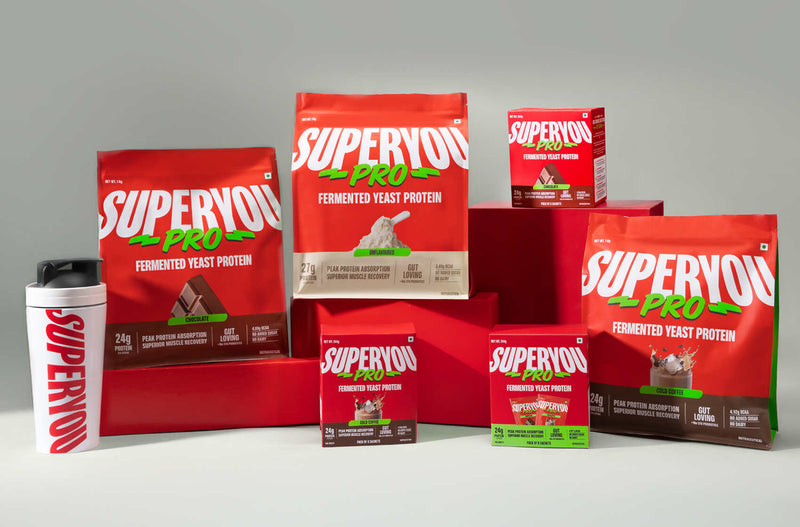You’ve got the protein. The scoop. The shake. The timing. You’re doing everything right.
But here’s the catch: if your body can’t absorb what you’re giving it, none of it matters.
This is the part no one tells you: absorption and digestion of protein are where the real gains happen. Not on the label, not on the shelf, but inside your gut. Most proteins never make it far enough to fuel results. They’re either absorbed too quickly to be fully used or too slowly to be efficient.
Let’s unpack why absorption matters more than just volume and why fermented yeast protein powder outperforms every other option.
Why Absorption and Digestion of Protein Matter
The body doesn’t use protein in its whole form. It first goes through digestion, breaking down into amino acids. These amino acids are then absorbed and sent off to repair muscle tissue, build enzymes, power metabolic processes, and aid recovery. If this process is inefficient, your protein supplement becomes a missed opportunity.
Here’s how that plays out in real life:
-
Too fast (like whey): quick amino acid surge, followed by an energy dip and wasted potential.
-
Too slow (like many plant proteins): delayed absorption, digestive discomfort, and underutilized nutrients.
-
Optimized: sustained release, no bloating, and full amino acid utilization over time.
This balance between rate and absorption efficiency is exactly where fermented yeast protein powder excels.
Whey Protein: High Speed, Low Precision
Whey is a complete protein with a PDCAAS score of 1.0. But its speed comes at a cost.
Rapid digestion means it floods your system with amino acids. While that may sound effective, your body can’t store them in large amounts. What it can’t use immediately is either excreted or oxidized, hardly the high-efficiency fuel you expected.
Add in lactose content, and for a significant portion of the population, whey becomes a gut disruptor. Even those without full-blown intolerance may experience bloating, cramping, or discomfort post-shake.
Plant-Based Protein: Cleaner, But Still Challenging
Many turn to plant-based protein to sidestep dairy and for good reason. It’s often gentler, more sustainable, and allergen-friendly. But digestibility still isn’t guaranteed.
Pea, soy, and rice proteins often contain antinutrients like phytic acid, which can inhibit absorption. They’re also incomplete proteins by default, lacking one or more essential amino acids, unless blended thoughtfully (and transparently).
Even when formulated well, many plant proteins are tough to digest. High in oligosaccharides, they can ferment in the gut, causing bloating and gas. So while cleaner than whey, they don’t always solve the problem.
Why Fermentation Matters
Fermentation doesn’t just make protein easier to digest; it fundamentally transforms how your body interacts with every gram. Here’s what that means at a biological level:
-
Breaks Down Complex Structures: During fermentation, enzymes and microbes pre-digest the protein, reducing large, hard-to-process proteins into smaller peptides and amino acids. This pre-digestion means your gut doesn’t have to work as hard to access the nutrients, absorption begins more efficiently and earlier in the digestive tract.
-
Removes Antinutrients: Traditional plant proteins often contain compounds like phytic acid or tannins that inhibit the absorption of minerals such as iron, calcium, and zinc. Fermentation breaks these antinutrients down, increasing the bioavailability of not just protein, but key micronutrients that support muscle, immune, and metabolic function.
-
Increases Amino Acid Availability: Fermentation helps release bound amino acids, especially those essential for muscle synthesis, like leucine and valine, making them more accessible for uptake into the bloodstream. This improves the overall amino acid score and ensures better net protein utilization.
-
Improves Gut Tolerance & Ecosystem: Unlike many proteins that strain the gut, fermentation encourages the growth of beneficial bacteria like Lactobacillus and Bifidobacterium. It also creates prebiotic compounds during the process, which help maintain microbial balance and support immune function.
-
Leads to Sustained Release: Because of its fermentation-led structure and slow digestibility, fermented yeast protein offers a steady stream of amino acids. This means better satiety, longer muscle protein synthesis windows, and less risk of spikes and crashes, especially when compared to whey’s rapid surge or the inconsistent absorption of non-fermented plant protein.
In other words, fermentation isn't just a clean-label buzzword. It’s a scientifically-backed method to enhance how well your body breaks down, absorbs, and uses every bit of the protein you consume, turning your shake from just a supplement into a more efficient metabolic ally.
Compare Your Options: The Absorption Scorecard
|
Feature |
Fermented Yeast Protein |
Whey Protein |
Plant Protein (Non-Fermented) |
|
Optimized Absorption |
Yes |
Too fast |
Too slow |
|
Complete Amino Acid Profile |
Yes |
Yes |
Most are incomplete |
|
No Digestive Stress |
Yes |
Common bloating |
Variable |
|
Sustained Protein Release |
Yes |
Spikes, crashes |
Inconsistent |
It’s Not Just What You Take, It’s What You Absorb
You don’t need more protein. You need protein that your body can use. If your current protein leaves you bloated, sore for longer, or hungry again in an hour, absorption might be the missing link.
Fermented yeast protein powder is designed with this in mind. It’s built to perform across the entire digestive process, delivering what your body actually needs: complete amino acids, steady energy, and no gut side effects.
Don’t Just Shake. Upgrade.
The right protein doesn’t just go down easily; it gets to work. SUPERYOU delivers protein absorption reimagined: clean, complete, and clinically smarter. Make the switch today and fuel your body the way it was meant to be fueled. Try SUPERYOU now!









